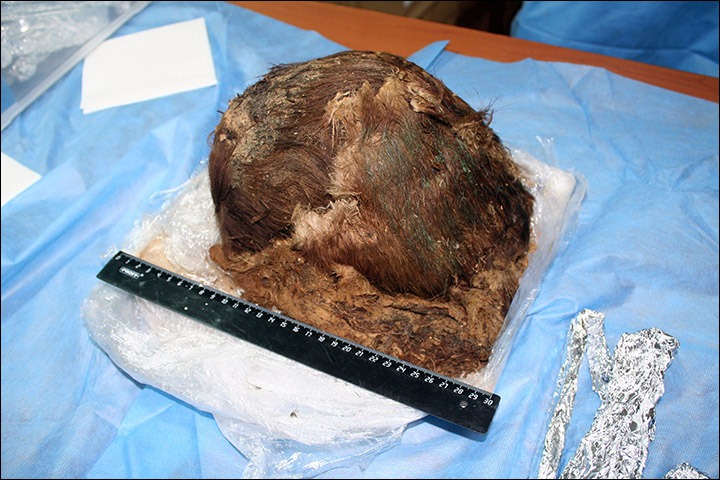Unearthed on the edge of the Arctic, she is the only woman so far found in an otherwise all-male necropolis, buried in a cocoon of copper and fur.

She has long eyelashes, a full head of hair – and impressive teeth. Picture: Irina Sharova
This haunting 12th century woman is a member of an unknown hunting and fishing civilisation that held sway in the far north of Siberia – with surprising links to Persia.
Accidentlally mummified and probably aged around 35, her delicate features are visible, the green tinge on her face being the traces of the pieces of a copper kettle that helped preserve her in her permafrost grave.
She has long eyelashes, a full head of hair – and impressive teeth.
Bronze temple rings were found close to her skull, wrapped inside animal skin – possibly reindeer – and birch bark that cocooned her.
Like other human remains, the medieval mummy’s feet were turned towards nearby Gorny Poluy River, a fact seen as having religious significance.
She was around 155 centimetres tall – 5ft 1 inch.

A raft of tests – including DNA – will be carried out by the joint team of Russian and South Korean scientists. Pictures: Institute of the Problems of Northern Development SB RAS
A baby – almost certainly a girl and too young to have teeth – also unearthed during this summer’s dig at Zeleny Yar archaeological site near Salekhard is not believed to be related to the woman, the rest of whose body is not well preserved.
Archaeologist Alexander Gusev, from Russia’s Arctic Research Centre, confirmed that the copper-clad mummy was the first find of an adult woman in this ancient burial site.

‘There are some badly preserved bones, which do not allow us to determine the gender, but he we clearly see from the face that she was a woman,’ he said.
‘This radically changes our concept about this graveyard.
‘Previously we thought that there were only adult men and children, but now we have a woman.
‘It’s amazing.’

‘Previously we thought that there were only adult men and children, but now we have a woman – it’s amazing.’ Pictures: Institute of the Problems of Northern Development SB RAS
The people to which this woman belonged survived by hunting and fishing on the edge of the Arctic Circle – but among three dozen adult graves previously investigated, all contained male remains, some with their skulls smashed, possibly suggesting this woman was socially important.
There were also graves of children of both genders.

A raft of tests – including DNA – will be carried out by the joint team of Russian and South Korean scientists investigating these archeological remains.
Meet the mummified Polar Princess, her long eyelashes and hair still intact after 900 years
The woman was around 155 centimetres tall – 5ft 1 inch. Picture: Institute of the Problems of Northern Development SB RAS
Dr Sergey Slepchenko, researcher at the Institute of the Problems of Northern Development SB RAS, Tyumen, said the head preserved well because it was ‘wrapped’ in pieces of copper kettle
‘The woman and the baby are from different graves, so we cannot say they are related,’ he said. ‘Definitely not a mother and child.’
Analysis is likely to take a year – and will depend on government funding for analysis seen by the academics as crucial to understanding the human presence in the Arctic.

He hopes to reconstruct the face of the woman.
Dr Slepchenko said: ‘During the natural conservation of the mummy in the soil, the rotting process was completed.
‘The remaining soft tissues were soaked with copper solution from those ritual plates with which the bodies were covered.’
Brain samples have been taken from the woman for paleo-DNA analysis


‘Arctic mummies, similar to those found in the Zeleny Yar, are very rare.’ Pictures: Institute of the problems of Northern Development SB RAS

Prof Dong-Hoon Shin, from Seoul National University, said: ‘In the world there are two types of mummies – artificial and natural.
‘Excellent examples of mummies of artificial origin are Egyptian.

‘The natural mummification of bodies of the buried is usually observed when certain conditions of the environment – permafrost, the presence of copper objects in the burial – and climate.

‘Arctic mummies, similar to those found in the Zeleny Yar, are very rare. That is why they are unique.’
He said: ‘Due to the high level of preservation the mummies internal organs are intact, too, which is incredibly interesting for our research.’


The mummy on way from the burial site to laboratory. Pictures: Alexander Gusev
Leave a Reply